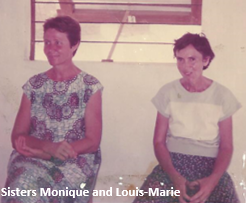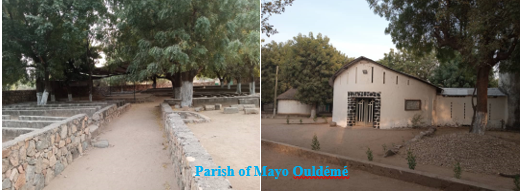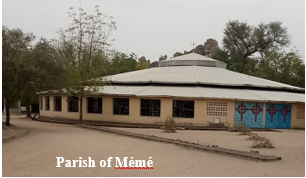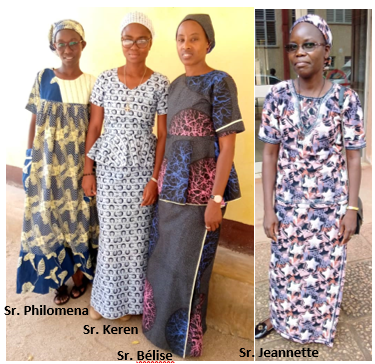THE HISTORY OF THE DAUGHTERS OF MARY AND JOSEPH IN CAMEROON
 The Daughters of Mary and Joseph first arrived in Cameroon in 1980 and settled at St. Mary’s Parish, Mayo Ouldémé. They were invited by the Bishop of Moroua-Mokolo diocese, Msgr Jacques de Bernon who wanted the presence of a female congregation in the yet to be created Parish of St. Francis of Assisi, Mémé.
The Daughters of Mary and Joseph first arrived in Cameroon in 1980 and settled at St. Mary’s Parish, Mayo Ouldémé. They were invited by the Bishop of Moroua-Mokolo diocese, Msgr Jacques de Bernon who wanted the presence of a female congregation in the yet to be created Parish of St. Francis of Assisi, Mémé.
Sisters Monique BOILS (Belgian) and Louis-Marie HANRAHAN (Irish) were the first to arrive in 1980, and in 1987 Sister Agnès Philips (Belgian) joined them in Mayo Ouldémé. In order to be able to communicate with the natives of the land they learned the local language Mada, which helped them to reach out easily and mix with the natives of the land irrespective of their nationalities and colour among others.

The Parish of Mémé was born from the parish of Mayo Ouldémé in 1988. St. Mary’s Parish, Mayo Ouldémé had two sectors; the mountain sector and the plain sector. To be able to better focus on each sector, St. Mary’s parish Mayo Ouldémé was to split in two. This brought to birth St Francis of Assisi Parish in Mémé for the plain sector.
Father Frans BYL, a Fidei Donum priest of the Diocese of Bruges arrived in Mayo Ouldémé in 1988 to become the first parish priest of the new parish of St Francis of Assisi in Mémé.
The sisters then settled in Mémé, after the constructions, with the help of the Brothers of the Gospel of Mayo Ouldémé.
In the parish of Mémé, the sisters were and are still involved in parish activities. These include helping in the sacristy, going out to the different sectors on Sundays, accompanying women, married couples, youth and children in their different movements, giving formation on hands-on skills to girls and young women who have not had the opportunity to study or further their studies.
 The sisters took care of HIV-AIDS positive patients to accompany them with counselling and help them with nutrition and means of transport for their drugs and this apostolate is still on-going.
The sisters took care of HIV-AIDS positive patients to accompany them with counselling and help them with nutrition and means of transport for their drugs and this apostolate is still on-going.
The sisters have always been at the disposal of the entire people to meet their needs according to their ability.
The DMJ presence among the people of Mémé strengthens them. We live our internationality by seeking to be one with the local people despite several different languages and cultures that differentiate us.
Sisters Monique BOILS (Belgian) and Louis-Marie HANRAHAN (Irish) were the first to arrive in 1980, and in 1987 Sister Agnès Philips (Belgian) joined them in Mayo Ouldémé. In order to be able to communicate with the natives of the land they learned the local language Mada, which helped them to reach out easily and mix with the natives of the land irrespective of their nationalities and colour among others.
The Parish of Mémé was born from the parish of Mayo Ouldémé in 1988. St. Mary’s Parish, Mayo Ouldémé had two sectors; the mountain sector and the plain sector. To be able to better focus on each sector, St. Mary’s parish Mayo Ouldémé was to split in two. This brought to birth St Francis of Assisi Parish in Mémé for the plain sector.
Father Frans BYL, a Fidei Donum priest of the Diocese of Bruges arrived in Mayo Ouldémé in 1988 to become the first parish priest of the new parish of St Francis of Assisi in Mémé.
The sisters then settled in Mémé, after the constructions, with the help of the Brothers of the Gospel of Mayo Ouldémé.
In the parish of Mémé, the sisters were and are still involved in parish activities. These include helping in the sacristy, going out to the different sectors on Sundays, accompanying women, married couples, youth and children in their different movements, giving formation on hands-on skills to girls and young women who have not had the opportunity to study or further their studies.
The sisters have always been at the disposal of the entire people to meet their needs according to their ability.
The DMJ presence among the people of Mémé strengthens them. We live our internationality by seeking to be one with the local people despite several different languages and cultures that differentiate us.

